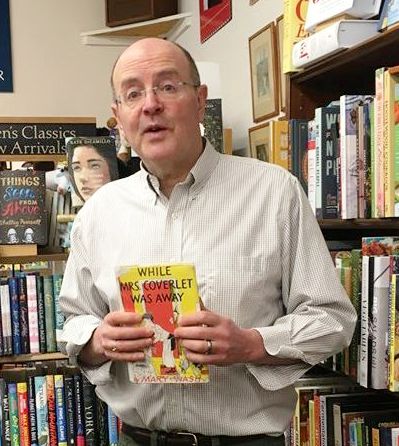 |
| Kenny Brechner |
Kenny Brechner, owner of DDG Booksellers, Farmington, Maine, last month resigned from the board of the American Booksellers Association, marking the first time in our memory that an ABA board member had resigned in protest.
Brechner's protest was about a change in policy concerning free expression. For much of its existence, the ABA has been a strong supporter of free expression, so much so that it founded the American Booksellers Foundation for Free Expression in 1990 to fight threats to the First Amendment rights of booksellers and their customers. (In 2014, the Foundation was folded into the association to create administrative efficiencies and broaden its work; it was renamed the American Booksellers for Free Expression Group at ABA, or ABFE.) The defense of free speech was a pillar of the association's goals and commitment. But the association has quietly changed its approach to free expression.
Shelf Awareness recently spoke with Brechner about his resignation and the new approach, which he described as a shift by the ABA "from active defense and engagement as an advocate of free speech to a resource provider who will funnel booksellers to organizations that are doing the work," like the Media Coalition and the Kids Right to Read Project of the National Coalition Against Censorship. The ABA will no longer, he continued, "actively participate in defending publishers against calls for censorship, join in efforts to fight legal threats to First Amendment expression which impact booksellers, actively fight school censorship cases or actively take positions on First Amendment issues," all this in an industry that is "particularly vulnerable and attractive to censorship."
To make the change, several parts of the Ends Policy, which guides the association's work, were reworded. The new phrase regarding free expression, which Brechner called "strategically nebulous," reads, "Core members have the resources in support of their right to freedom of expression." Other references to free expression in a legal or regulatory context were removed, he said.
Brechner proposed that the phrase free expression (shown in bold below) be added to key sections of the Ends Policy. Thus, "The American Booksellers Association exists so that its core membership of independent bookstores can operate successfully as sustainable businesses and constitute a vital channel in the U.S. book market. This will be achieved at a level that justifies the resources invested while ensuring the association's long-term financial sustainability. This also will be done in a manner that demonstrates a commitment to antiracism, equity, access, representation and free expression.... Legal and regulatory policies reflect the interests of independent bookstores in such areas as antitrust action, free expression and small business assistance."
The change has come about, Brechner added, because of tension between two approaches. Traditional support of the First Amendment emphasizes what he called "a freedom to philosophy," where freedom of speech is encouraged and speech is regulated only when it "takes away the freedom of someone else, such as in cases of illegal harm, libel, slander or the provocation of violence such as a face-to-face racial slur, which constitutes assault."
The newer "selective support" of free speech has "a freedom from philosophy," Brechner said, which posits that "some books can be seen as sources of actionable harm that require censorship as a means of protecting individuals from them."
Brechner said that the core issue is the view of some booksellers that "free expression is an impediment to values recently enumerated in its Ends Policies--antiracism, equity, access, and representation," which he called "a false premise." History, he continued, shows that "free expression is the bulwark of those values. It's a false argument that the First Amendment and DEI matters are mutually exclusive."
Some proponents of the limited approach to free expression argue, he said, that "both-siderism," a recent narrow redefinition of much of journalism and free expression, "is always racist, and free expression is both-siderism, so free expression is racist." He called it "closed-loop reasoning" that doesn't allow for open debate or critical reasoning. He also noted the argument that advocates of free speech are primarily those in power who don't want to give up their power. However, he said, free expression has always benefited minority voices and historically in the U.S., those minority voices have been the groups and ideals that the ABA says it wants to support and protect.
Brechner noted that in history "no one censored a book without thinking they were making the world a better place or protecting people." The ABA's approach is considered "a new take" by its adherents, but it's merely "a different wrinkle put on the age-old impulse to censor views you don't like," Brechner said. "Only by supporting all speech is our speech protected."
The drive to censor is all the more dangerous because, as he's pointed out, the political pendulum swings with regularity. "The ABA perceives this as a right-wing issue," but that historically is inaccurate. "Free expression has always supported minority voices, and just because you don't like a particular minority voice right now" doesn't make censorship right, he said.
Brechner called his decision to resign from the ABA board "wrenching" but something he needed to do because "I care about the ABA deeply. Having a wider discussion and creating an environment where critical discourse is welcome on this or any other topic is in the organization's best interest." --John Mutter
 Socialight Society, a Black-owned bookstore that began as a bookclub and pop-up shop, will open a "microshop" inside Soul Nutrition, a smoothie and tea shop in downtown Lansing, Mich., this weekend.
Socialight Society, a Black-owned bookstore that began as a bookclub and pop-up shop, will open a "microshop" inside Soul Nutrition, a smoothie and tea shop in downtown Lansing, Mich., this weekend. 














 While Germany's book market sales appear to be on track to catch up with pre-pandemic numbers by the end of the year,
While Germany's book market sales appear to be on track to catch up with pre-pandemic numbers by the end of the year,  A
A  Eric and Jessica Green begin their next chapter at
Eric and Jessica Green begin their next chapter at  "
"
 Indian-American novelist Thrity Umrigar (
Indian-American novelist Thrity Umrigar (